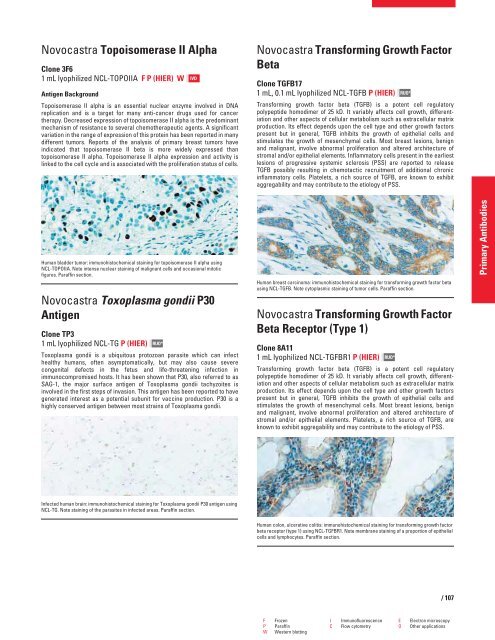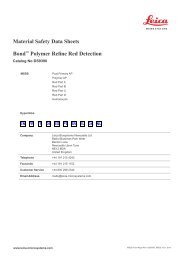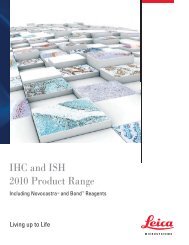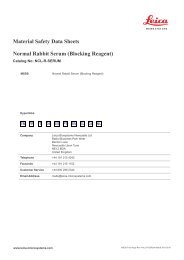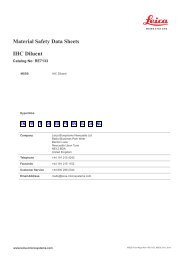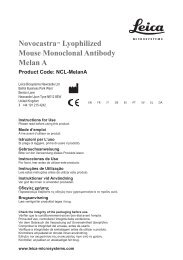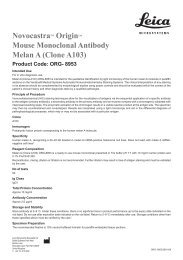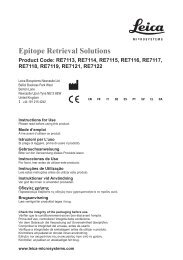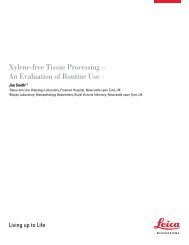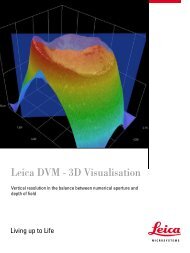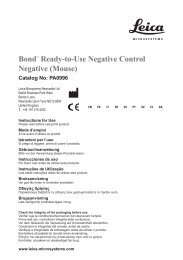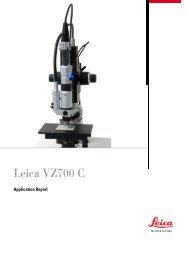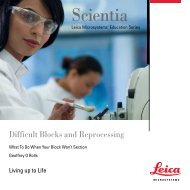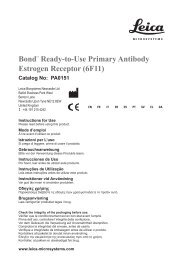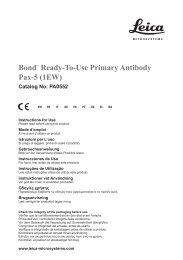QF0159 Marketing Release Record
QF0159 Marketing Release Record
QF0159 Marketing Release Record
You also want an ePaper? Increase the reach of your titles
YUMPU automatically turns print PDFs into web optimized ePapers that Google loves.
Novocastra Topoisomerase II Alpha<br />
Clone 3F6<br />
1 mL lyophilized NCL-TOPOIIA F P (HIER) W<br />
Antigen Background<br />
Topoisomerase II alpha is an essential nuclear enzyme involved in DNA<br />
replication and is a target for many anti-cancer drugs used for cancer<br />
therapy. Decreased expression of topoisomerase II alpha is the predominant<br />
mechanism of resistance to several chemotherapeutic agents. A significant<br />
variation in the range of expression of this protein has been reported in many<br />
different tumors. Reports of the analysis of primary breast tumors have<br />
indicated that topoisomerase II beta is more widely expressed than<br />
topoisomerase II alpha. Topoisomerase II alpha expression and activity is<br />
linked to the cell cycle and is associated with the proliferation status of cells.<br />
Human bladder tumor: immunohistochemical staining for topoisomerase II alpha using<br />
NCL-TOPOIIA. Note intense nuclear staining of malignant cells and occasional mitotic<br />
figures. Paraffin section.<br />
Novocastra Toxoplasma gondii P30<br />
Antigen<br />
Clone TP3<br />
1 mL lyophilized NCL-TG P (HIER)<br />
RUO*<br />
Toxoplasma gondii is a ubiquitous protozoan parasite which can infect<br />
healthy humans, often asymptomatically, but may also cause severe<br />
congenital defects in the fetus and life-threatening infection in<br />
immunocompromised hosts. It has been shown that P30, also referred to as<br />
SAG-1, the major surface antigen of Toxoplasma gondii tachyzoites is<br />
involved in the first steps of invasion. This antigen has been reported to have<br />
generated interest as a potential subunit for vaccine production. P30 is a<br />
highly conserved antigen between most strains of Toxoplasma gondii.<br />
Infected human brain: immunohistochemical staining for Toxoplasma gondii P30 antigen using<br />
NCL-TG. Note staining of the parasites in infected areas. Paraffin section.<br />
IVD<br />
Novocastra Transforming Growth Factor<br />
Beta<br />
Clone TGFB17<br />
1 mL, 0.1 mL lyophilized NCL-TGFB P (HIER)<br />
Transforming growth factor beta (TGFB) is a potent cell regulatory<br />
polypeptide homodimer of 25 kD. It variably affects cell growth, differentiation<br />
and other aspects of cellular metabolism such as extracellular matrix<br />
production. Its effect depends upon the cell type and other growth factors<br />
present but in general, TGFB inhibits the growth of epithelial cells and<br />
stimulates the growth of mesenchymal cells. Most breast lesions, benign<br />
and malignant, involve abnormal proliferation and altered architecture of<br />
stromal and/or epithelial elements. Inflammatory cells present in the earliest<br />
lesions of progressive systemic sclerosis (PSS) are reported to release<br />
TGFB possibly resulting in chemotactic recruitment of additional chronic<br />
inflammatory cells. Platelets, a rich source of TGFB, are known to exhibit<br />
aggregability and may contribute to the etiology of PSS.<br />
Human breast carcinoma: immunohistochemical staining for transforming growth factor beta<br />
using NCL-TGFB. Note cytoplasmic staining of tumor cells. Paraffin section.<br />
Novocastra Transforming Growth Factor<br />
Beta Receptor (Type 1)<br />
Clone 8A11<br />
1 mL lyophilized NCL-TGFBR1 P (HIER)<br />
RUO*<br />
RUO*<br />
Transforming growth factor beta (TGFB) is a potent cell regulatory<br />
polypeptide homodimer of 25 kD. It variably affects cell growth, differentiation<br />
and other aspects of cellular metabolism such as extracellular matrix<br />
production. Its effect depends upon the cell type and other growth factors<br />
present but in general, TGFB inhibits the growth of epithelial cells and<br />
stimulates the growth of mesenchymal cells. Most breast lesions, benign<br />
and malignant, involve abnormal proliferation and altered architecture of<br />
stromal and/or epithelial elements. Platelets, a rich source of TGFB, are<br />
known to exhibit aggregability and may contribute to the etiology of PSS.<br />
Human colon, ulcerative colitis: immunohistochemical staining for transforming growth factor<br />
beta receptor (type 1) using NCL-TGFBR1. Note membrane staining of a proportion of epithelial<br />
cells and lymphocytes. Paraffin section.<br />
F Frozen I Immunofluorescence E Electron microscopy<br />
P Paraffin C Flow cytometry O Other applications<br />
W Western blotting<br />
/ 107<br />
Primary Antibodies


